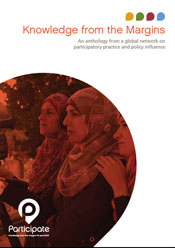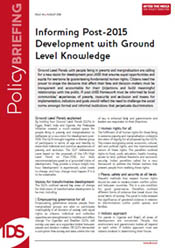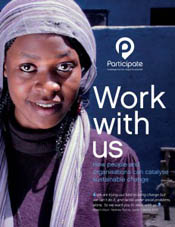Impact Achieved
The Participate Initiative has achieved impact both in relation to contributing to policy decision-making and in shaping debates and discussions about what should be included in the SDG framework and how it should be implemented and monitored.
Through a targeted influencing and engagement strategy delivered in partnership with its global network of partners the Participate Initiative was able to:
- Shape thinking of Post-2015 High Level Panel and key UN civil society stakeholders to reflect the views of the poorest and most marginalised.
- Shape thinking of national government ministers and national development agencies, including the UK Department for International Development in relation to the SDG framework.
- Contribute to messaging in the final SDG framework, particularly around the phrase ‘Leave no one behind’ which came directly from the ATD 4th World research and was amplified by the Participate Initiative’s synthesis report.
- Contribute to thinking on framework language around increased public participation in political processes (GOAL 10: Target c) through targeted publications and workshops.
- Lay down the foundations for a global network of participatory researchers, which is collectively run by members whose work is rooted in communities of people who live in poverty and marginalisation.
Over the duration of both phases of the programme IDS has created opportunities, animated networks and showcased research to ensure that perspectives of the poorest and most marginalised are incorporated in the next set of Sustainable Development Goals.
It has done this in various ways, including:
1. Targeted and high-impact publications
In 2013, IDS published a timely edition of its flagship IDS Bulletin, as world leaders prepared for the UN General Assembly’s special event on the Millennium Development Goals (MDGs) in September. Whose Goals Count? brought prominent Southern voices – including current President of Malawi, Joyce Banda and Mwangi Waituru, co-chair of Beyond 2015 and Participate contributor – into the policy discourse onwhat replaces the MDGs.
Since becoming available as a gold open access publication in 2016, this edition of the IDS Bulletin has had 1,454 downloads, and since publication in 2013 it has had a total of 3,438 page views.
IDS also produced a new Policy Briefing series, After the MDGs: IDS Policy Analysis. Aimed at policymakers, these seven papers addressed issues including gender, social protection, participation, sustainability, water and nutrition. The Participate Initiative contributed a policy briefing to the series, Informing Post-2015 Development with Ground Level Knowledge, which was based on opinions expressed in the final communiqués of the four Ground Level Panels that were hosted by the Participate initiative in Brazil, Egypt, India and Uganda. The panels created a much-needed space for people living in poverty and marginalisation to deliberate on a new vision for development post-2015.
Since publication the briefing has been downloaded nearly 2,000 times.
Participate also produced an additional IDS Policy Briefing, Designing Inclusive Targets for a Post-2015 Agenda, which since publication in 2014 has been downloaded over 1,000 times from the IDS open access repository, OpenDocs.
Work With Us was the programme’s flagship report which brought together the research of 18 participatory research groups in 29 countries who were working with the poorest and most marginalised. The report articulated their experiences, their priorities, and their vision of how development should be done.
Participate Initiative work has also been showcased in high profile UN reports such as ‘A million voices: The world we want” and Making the UN ‘Fit for Purpose’: Lessons from the ‘Delivering as One’ Experience.
View a full list of Participate’s publications
2. Building networks and relationships

A key aspect of Participate‘s engagement strategy was attending the High Level Panel (HLP) meetings in London, Bali, and Monrovia and holding side events and briefings and communicating the stories of the poorest and most marginalised to policy makers through digital storytelling.
For example in London Danny Burns and Joanna Wheeler presented to all of the HLP members over an hour lunch time session. In Liberia 13 HLP panel members or advisors attended a two hour workshop where the Participate Initiative facilitated small group discussion to allow members to develop a solid grasp of the messages we were asking them to reflect on, and in particular understanding ‘what’ people living in poverty want. At the end of the workshop, panel members agreed six key messages that they wanted to incorporate into the deliberations of the HLP.
Following Participate contributions at the Bali High Panel Meeting, Jess Espey, advisor to President of Liberia, Ellen Johnson Sirleaf said:
Your summary document was handed out to the Panellists on Thursday. They were very impressed that you’d turned around the note so quickly.
Participate built a particularly close relationship with five of the HLP panel members who actively incorporated their learning from Participate into their text submissions for the HLP report.
The Participate Initiative was also keen to share stories of life on the margins with policy makers and did this through two separate exhibitions of participatory video and photography in New York during the UN General Assembly in September 2013 and inside the UN Headquarters in March 2014.
The Permanent Mission of Ireland to the UN in New York supported us to hold the Participate exhibition in the UN Headquarters. This was an opportunity to exhibit some of the written and visual, participatory research directly to UN staff and Member States. The reception was hosted by the Irish UN permanent representative. Speakers included the Irish minister for development and trade and the Papua New Guinea permanent representative to the UN. The meeting was well attended by senior officials in the United Nations including Amina Mohammed, special adviser to Ban Ki-Moon on post-2015 planning.
Thank you for the opportunity to bring “Work With Us” to the UN. The feedback we received from Member States, UN System and Civil Society colleagues has been very positive.
Participate also contributed to a high-profile event in Westminster co-hosted by IDS with the UK NGO network Bond and the Beyond 2015 UK Group. The event, which was attended by over 150 leading civil society campaigners, academics, experts and policy makers, firmly positioned Participate and IDS as influential in the post- 2015 debate, with speakers including UK Secretary of State Justine Greening, and Precious Gbeneol, Senior Special Assistant to the President of Nigeria on MDGs.
An integral part of the programme and core to its values, vision and mission were the ground-level panels (GLPs) which brought together poor and marginalised communities to discuss their priorities. The Participate Initiative also facilitated direct interaction between ground-level panellists and national decision-makers where perspectives and outcomes of the GLPs were shared. GLP communiqués and an outcome report were sent to HLP members and UN and civil society stakeholders, and a commemorative ‘Voice for Change’ postage stamp was created by India Post and launched at GLP stakeholder outreach day.
Ground-level panellists blogs
- Change through Streets, Squares, and Dialogue
- Awêre para Kisile: Brazil Ground Level Panel
- The Ugandan Experience
- We Stride Forward in the Hope of Success
In addition to the high level panel close relationships were built with key UN decision makers and influencers including Amina Mohammed (Assistant Secretary General and special advisor on SDG’s), Paul Ladd (Director of UNDP policy team on SDG’s) and Corrine Woods (Director of the UN Millennium Campaign).
The current phase of the participatory monitoring and accountability programme has continued to build on these relationships and engaged with the first High Level Political Forum in New York in July 2016, through the participation of one of our partners at a side event organised in partnership with Together 2030.
The Initiative continues to engage with BOND in the UK, and with UN agencies UNDP and UNICEF at Headquarters and in country. It has also participated in a Commonwealth Parliamentarians Association conference to give input on participatory research and the Leave No-One Behind Agenda, and is working with BOND and others to raise the profile of the SDGs in the UK.
Participate Global Participatory Research Network
A major outcome of the Participate Initiative was the creation of an ongoing global network for participatory research whose members can be viewed on this interactive map.
3. Media engagement
The Initiative also worked closely with partners to ensure the stories of the poorest and most marginalised and the work of Participate was profiled in an accessible way to a broader audience through media. Over its first phase, the Initiative was featured in several high profile outlets including the Guardian, and in relevant forums such as post2015.org, Oxfam’s From Poverty to Power blog, World Bank’s – People, Spaces, Deliberation blog and Think Africa.
The formal independent evaluation report of the Beyond 2015 Campaign which was based on over 30 interviews with organisations including NGO’s, UN agencies and country missions, and the Mid-Term Review of the Campaign concluded that the Participate Initiative had made a positive contribution to Post-2015 debates and amplified the voices of the poorest and most marginalised.
There is unanimous high appreciation of the research brought by Participate, which is also perceived to have resulted in legitimacy and strengthened policy and advocacy capacity
BEYOND 2015 CAMPAIGN EVALUATION REPORT
…evidence that the Participate Initiative has brought the perspectives of the poorest into the Post-2015 debate by engaging with UN and Governments as well as policy makers at different levels
4. Learning
Despite being invisible in logframes and results-based approaches to impact; for me, the networks formed have been a unique contribution of Participate across the diverse regions and spaces where it has engaged
 Critical reflection was an integral strand of the Participate Initiative process and the learning around using participatory approaches to influence policy was captured in an anthology produced by the Initiative. From the outset, the programme identified a number of risks including failure of the Initiative to have an impact on the post 2015 agenda or to create space for communities and citizens to voice their concerns and needs on how the agenda should be shaped.
Critical reflection was an integral strand of the Participate Initiative process and the learning around using participatory approaches to influence policy was captured in an anthology produced by the Initiative. From the outset, the programme identified a number of risks including failure of the Initiative to have an impact on the post 2015 agenda or to create space for communities and citizens to voice their concerns and needs on how the agenda should be shaped.
In the anthology those involved reflected on how far these risks had been mitigated and the key areas of learning from the Initiative which include:
- The programme’s ability to influence the post-2015 agenda was assisted by the availability of resources, energy and commitments invested by international institutions, organisations and governments in the process. However at the same time it was limited by the short time frame or window of opportunity for influencing and to create a valid and sustained space for the poor and marginalised to shape debates.
- Stories are a valuable tool in influencing policy makers, and can help build empathy and connections in a way that statistics or abstract recommendations are unable to.
- The role of the researcher matters. Researchers who were part of the Participate Initiative became closely engaged in political processes and strategies, building relationships with the gatekeepers of global-level policy to ensure the voices of the poorest and most marginalised were heard. However, this came with risks and in particular, that the voices and agendas of researchers would not reflect the perspectives of those at grassroots level.
- Influencing policy requires constant innovation of approaches to bridge the gap between people on the ground and policy makers. Adherence to certain principles, values and ways of working is key for maintaining the legitimacy and integrity of a process from the research perspective.
- Networks are key.
- The process is often more important than short term policy wins.
Those deeply involved in the work of Participate – research participants, policymakers, researchers, advocates – will continue to work for social justice and democratic development – and we will have new knowledge and experience to draw upon
Related resources
- Burns, D. and Gorman, C. (2014) ‘Designing Inclusive Targets for a Post-2015 Agenda, IDS Policy Briefing 68, Brighton: IDS
- Burns, D., Howard, J., Lopez-Franco, E., Shahrokh, T. and Wheeler, J. (2013) Work with Us: How People and Organisations can Catalyse Sustainable Change, Brighton: IDS.
- Cardama, M (2015) Beyond 2015 Campaign Final Evaluation
- Green, D. (2013) ‘Panels of the Poor: What would Poor People Do if They were in Charge of the Post-2015 Process?’, World Bank’s People, Spaces, Deliberation blog, 14 August
- Guerra, M. (2013) ‘Awêre para Kisile: Brazil Ground Level Panel’, Participate Website, 18 July
- Hemeida, K. (2013) ‘Change through Streets, Squares, and Dialogue’, Participate Website, 16 July
- Leavy, J. and Howard, J. (2013) What Matters Most? Evidence from 84 Participatory Studies with Those Living with Extreme Poverty and Marginalisation, Brighton: IDS and Beyond 2015
- Lopez-Franco, E. and Shahrokh, T. (2013) ‘Informing Post-2015 Development with Ground Level Knowledge’, IDS Policy Briefing 44, Brighton: IDS
- Lubaale, L. and Newell, N. (2013) ‘The Ugandan Experience’, Participate Website, 23 July
- Manning, R., Harland Scott, C. and Haddad, L. (2013) Whose Goals Count? Lessons for Setting the Next Development Goals, IDS Bulletin, 44.5-6
- Marnie, S. (2013) A Million Voices: The World We Want. A Sustainable Future with Dignity For All, UNDG
- Participate Initiative, www.participate2015.org/
- Shahrokh, T. (2016) ‘Are we Already Left Behind? Participate at the HLPF for the SDGs‘, Participate Website, 26 July
- Thomas, T. (2013) ‘We Stride Forward in the Hope of Success’, Participate Website, 26 July
- Tran, M. (2013) ‘Post-2015 Process Must Prioritise Basic Needs for the Poorest’, The Guardian, 27 March

